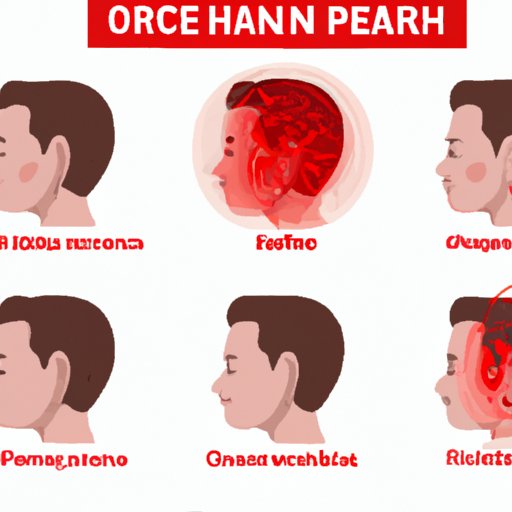
I. Introduction
An earache is a common condition that affects people of all ages. It occurs when the area around the ear becomes inflamed or infected, leading to pain and discomfort. While earaches can often be alleviated with home remedies, it can be difficult to know where to start. In this article, we will provide a step-by-step guide to relieving earache pain at home, explain when it’s necessary to seek medical attention, and offer tips for preventing earaches in the future. We will also explore the pros and cons of traditional and holistic treatments and debunk common myths about earaches.
II. A step-by-step guide to relieving earache pain at home
There are several home remedies that can help alleviate earache pain, including:
- Applying a warm compress: Use a warm, moist washcloth and place it over the affected ear for 15-20 minutes. Repeat several times a day as needed.
- Using over-the-counter pain relievers: Pain relievers such as acetaminophen or ibuprofen can help alleviate earache pain. Follow the instructions on the label and do not exceed the recommended dosage.
- Using ear drops: Over-the-counter ear drops can help alleviate earache pain. Follow the instructions on the package carefully and do not exceed the recommended dosage.
- Trying garlic oil: Garlic contains natural antibacterial properties. Warm a few drops of garlic oil and apply it to the affected ear. Be sure to use only a few drops at a time.
- Trying hydrogen peroxide: Hydrogen peroxide can help remove excess earwax that may be causing pain. Use a dropper to apply a few drops of hydrogen peroxide to the affected ear. Wait a few minutes and then turn your head to allow the solution to drain out. Be sure to use only a small amount of hydrogen peroxide at a time.
It’s important to note that these remedies may not work for everyone and could potentially worsen the situation. Always consult with a healthcare professional before trying out any of these remedies. Never insert any object into the ear canal to alleviate pain.
III. The importance of seeking medical attention for earaches
While home remedies can often help alleviate earache pain, it’s important to know when to seek medical attention. Visit a doctor or healthcare professional if you experience any of the following:
- Severe or worsening pain
- Drainage from the ear
- High fever
- Difficulty hearing or loss of hearing
- Blood or pus coming from the ear
Untreated ear infections or other ear-related conditions can lead to more serious complications, such as hearing loss or facial paralysis, so it’s important to seek medical attention as soon as possible.
IV. How to prevent earaches
Preventing earaches starts with adopting a few healthy habits. Here are some tips:
- Avoid smoking and exposure to secondhand smoke
- Keep ears clean and dry, but do not insert anything into the ear canal
- Avoid exposure to loud noises or wear earplugs
- Practice good hygiene to prevent colds and other infections that may lead to earaches
If you frequently experience earwax buildup, seek professional ear cleaning services instead of using cotton swabs, which may push earwax further into the ear canal.
V. Traditional vs. holistic treatments for earaches
When it comes to treating earaches, there are two main approaches: traditional medicine and alternative treatments. Traditional medicine involves Western medical treatments, such as antibiotics, pain relievers, and surgery. Alternative treatments, also known as holistic medicine, often involve natural remedies, such as herbal supplements, acupuncture, and aromatherapy.
Each approach has its own benefits and drawbacks. Traditional medicine may be more effective for severe earaches or infections, while alternative treatments may be a gentler, holistic alternative. It is always important to consult with a healthcare professional before trying any type of treatment.
VI. Earache myths debunked
There are several misconceptions about earaches that can lead to ineffective treatment. Here are some common myths:
- Myth: Earwax should be removed frequently. Fact: Earwax is a natural substance that helps protect the ear canal. Removing it too frequently can lead to dryness and irritation.
- Myth: Holding a warm towel against your ear will always alleviate pain. Fact: While this may work for some people, it may not be effective for everyone.
- Myth: Swimmer’s ear only affects people who swim frequently. Fact: Swimmer’s ear can affect anyone and is caused by water remaining in the ear after bathing or swimming.
Always consult with a healthcare professional if you have any concerns about ear pain or any other health conditions.
VII. Conclusion
Earaches can be uncomfortable and sometimes even debilitating, but there are several home remedies, lifestyle changes, and medical treatments available to help alleviate pain. By taking care of your ears and seeking professional help when needed, you can prevent long-term complications and protect your overall health.





